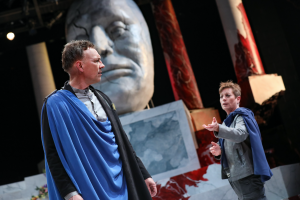Chaos, COVID-19, and Julius Caesar
May 27, 2020 | Professor Adam Versenyi
This is a blog post featured in the IAH Election Blog Series. The series aims to provide intellectual, humanistic, and artistic insights on the 2020 U.S. elections. Faculty writers determine their own topic, looking to cover themes that foster conversations across differences and demonstrate the unique insights the humanities can offer. This blog post was written by Adam Versényi, Professor and Chair of the Department of Dramatic Art at the University of North Carolina at Chapel Hill.
Chaos, COVID-19, and Julius Caesar

It’s easy to draw parallels between Shakespeare’s Julius Caesar and President Donald J. Trump, as New York’s Public Theater did in 2017. Right-wing media outlets fulminated that the production depicted President Donald J. Trump’s assassination. Two corporate sponsors pulled support. Protestors stormed the Central Park stage shouting “Stop the normalization of political violence against the right!” But the play is concerned with much more than one leader or style of leadership. Especially as another election approaches amid the chaos of pandemic and economic woes, Julius Caesar provides us with provocative ways to think about our times.
Written in 1599 and first performed at London’s Globe Theatre, Julius Caesar reflects the shaky nature of English society in the later years of Queen Elizabeth I’s rule as she increasingly relied upon spies and propaganda to maintain a semblance of stability. The Earl of Essex and Robert Cecil vied for political power. Like the United States now, Shakespeare’s Rome was in a moment of great transition. The play takes place after the Romans overthrew the Etruscan Tarquin family, paving the way for the Roman Republic.
Like Trump, Caesar was born into wealth yet styled himself the people’s champion. He was also an autocrat out for personal power and even a throne. In the Public Theater ‘s interpretation, Trump was an obvious parallel. The actor wore a heavily styled blond and a red tie. He tweeted from a golden bathtub, conversed with a wife with a Slavic accent, and was ultimately assassinated beneath an American flag by a cast of women and minorities. This heavy-handed approach, unsurprisingly, led to the subsequent controversy. While we certainly discussed parallels to our own society as we prepared our production at PlayMakers Repertory Company, we purposefully avoided direct comparisons between Caesar and Trump as we sought a subtler, more complex understanding of Shakespeare’s play.

As we rehearsed Julius Caesar at PlayMakers Repertory Company on the UNC campus in Chapel Hill, North Carolina, 2020 opened up fresh nuances. Using director Andrew Borba’s version of the original script, we cast a female actor as Cassius and Marc Antony even as women candidates like Elizabeth Warren and Amy Klobuchar attempted to win support in the traditionally male space of presidential campaigns. Caesar’s famous lines — “Yond Cassius has a lean and hungry look:/She thinks too much:/… She reads much,/She is a great observer, and she looks/Quite through the deeds of men” — took on a very different character, an Elizabethan version, perhaps, of she’s too “shrill” or is “unelectable” or, in Shakespeare’s word “dangerous” with a woman playing the role.
Following Super Tuesday and Vice President Joe Biden’s virtual sweep, Caesar’s assassination by thirty-two stab wounds resonated with the ramped-up slashes and criticisms the moderate wing of the Democratic Party laid upon Senator Bernie Sanders’ candidacy. Meanwhile, the common people who, in Shakespeare’s Forum scene, initially demand that Brutus become “another Caesar” only to immediately deem Brutus a traitor during Antony’s “Friends, Roman, countrymen” speech, resembled nothing so much as the fickle populace pivoting between first one, then another Democratic candidate in our own electoral season.
Cassius and Antony, like Russian bots, Facebook trolls, or Bloomberg robocalls, consciously seek to manipulate the political leanings of the populace and sow discord amidst those in power. Having driven Brutus and Cassius from Rome, Antony, Octavius Caesar, and Lepidus, like Trump’s firings of Ambassador Gordon D. Sondland, Lt. Col. Alexander S. Vindman, and Inspector General Michael Atkinson for their perceived disloyalty during the impeachment hearings, proscribe and put to death one hundred senators. Meanwhile, Cassius plays on Brutus’ ego by planting anonymous letters of praise, a modern-day evocation of a friendly Tweet barrage.

The multifaceted nature of political discourse and machination is Shakespeare’s point and why Julius Caesar, which shifts perspective between Caesar, Brutus, Cassius, and Marc Antony’s points of view, has had such resonance since Shakespeare’s time. The play ponders the most effective path to follow when political ambition overreaches. Shakespeare also shows us the chaos unleashed by political assassination. Brutus and Cassius, the leaders of the conspiracy to assassinate Caesar and prevent his monarchical ambitions, both claim to be motivated by the public good. Yet they are both adherents of foreign philosophies—Stoicism in Brutus’ case, Epicureanism for Cassius—that emphasize the personal serenity of the individual in order to be free of passion and pain, rather than the individual’s action for the public good.
Cassius’ exhortation that “The fault, dear Brutus, is not in our stars,/But in ourselves that we are underlings” leads to Brutus’ conclusion that Caesar is “as a serpent’s egg/Which hatch’d, would as his kind grow mischievous,/And kill him in the shell.” Yet that action meant to restore Rome to its Republican glory and stability creates instead a bloody civil war that ultimately results in the establishment of the Roman Empire. The play’s final act, in fact, gives us a series of actions based upon error and misunderstanding that results in the suicides of Portia, Cassius, Titinius, and Brutus. As we have seen during the Covid-19 pandemic, many leaders have embraced scientific knowledge and analysis as they crafted their policies in response to the virus, while politicians from UK Prime Minister Boris Johnson to Brazilian President Jair Bolsonaro have dismissed the science and suffered the error of their ways both personally, as Johnson became infected with the virus, and politically, as Bolsonaro became embroiled in controversy over his handling of the virus.
An Elizabethan version of the Ancient Greeks’ exhortation of “all things in moderation”, Shakespeare’s play demonstrates the chaos and cost caused by the kind of violent upheaval and change in Caesar’s Rome and that we have experienced in our own society in the past four years. Chaos, cost, and upheaval became even more pronounced in our experience as the Covid-19 outbreak caused us to close our theatre shortly after opening our production. Reflecting back upon our experience with Julius Caesar after almost three months of global lockdown and as a number of U.S. states begin to ease restrictions, Shakespeare’s play, with its warnings against blind adherence to the efficacy of any one political policy, societal system, or economic program, seems ever more prescient. The ability of a single virus to change the world and the lack of an effective treatment for it as of yet has created an incredibly fluid environment in which all our actions, both personal and political, have to contend with ambiguity. In this context, Julius Caesar takes us on an exciting and perilous journey where we must choose whether or not to take a stand: politically, academically, artistically, or in our most intimate relations. The play ultimately asks us: what is the nature of active citizenship in challenging times? You decide.
If you are a UNC faculty member and interested in submitting a proposal for the series, please email IAH Communications Specialist Sophia Ramos at sophiav@email.unc.edu.

